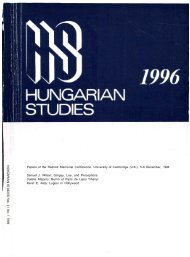The Canadian-American Review of Hungarian Studies - Vol. 4 ... - EPA
The Canadian-American Review of Hungarian Studies - Vol. 4 ... - EPA
The Canadian-American Review of Hungarian Studies - Vol. 4 ... - EPA
Create successful ePaper yourself
Turn your PDF publications into a flip-book with our unique Google optimized e-Paper software.
and literary elite in several European countries. But in time, it also led tohis close and life-long association with New <strong>Canadian</strong>s, and amongthem, <strong>Hungarian</strong>s.Kirkconnell was first attracted to the Icelandic community <strong>of</strong> Manitoba.Two <strong>of</strong> his Wesley College friends, Skuli Johnson and OlafurAnderson, were <strong>Canadian</strong>-Icelanders; so were many <strong>of</strong> Kirkconnell'sstudents. <strong>The</strong> College library was well stocked with books on Icelandicgrammar, poetry and literature. It is not surprising that the first volumein Kirkconnell's projected series <strong>of</strong> translations from the nationalpoetries <strong>of</strong> European peoples was the North <strong>American</strong> Book <strong>of</strong> IcelandicVerse (New York: Carrier and lies, 1930). "My anthology," wroteKirkconnell many years later, "proved to be a key to the hearts <strong>of</strong> the<strong>Canadian</strong> Icelanders." 15Closer links with the world <strong>of</strong> immigrant ethnics wrought a change inKirkconnell's approach to popularizing the European cultural achievement.His first work in the field <strong>of</strong> verse translation, European Elegies,had a potential to serve the interests <strong>of</strong> <strong>Canadian</strong>s <strong>of</strong> European background,but this had not been Kirkconnell's original purpose. <strong>The</strong>young scholar's subsequent publications had different motives. In hisnext general work, <strong>The</strong> European Heritage {London and Toronto: J. M.Dent and Sons Ltd., 1930), Kirkconnell deliberately set out to combatignorance, the "mother <strong>of</strong> intolerance," as he put it in the volume'spreface. He wrote further:Saxon and Slav, Norseman and Celt, all have gifts that have beenproved great in the annals <strong>of</strong> civilization; but sincere co-operation,whether in the New World or in the Old, becomes humanly possibleonly as men realize the worth <strong>of</strong> their fellow men. 16<strong>The</strong> volume, some two hundred pages <strong>of</strong> appreciative comments aboutthe cultural achievements <strong>of</strong> European nations, undoubtedly generateda warm respect for European cultures in the hearts <strong>of</strong> his readers. Suchsentiments were bound to benefit Canada's European immigrants.In addition to writing a survey <strong>of</strong> European history, Kirkconnellbegan publicising the works <strong>of</strong> New <strong>Canadian</strong> poets. 17 His most substantialpublication dealing with this poetry was <strong>Canadian</strong> Overtones(Winnipeg: Columbia Press, 1935), an anthology <strong>of</strong> verse translatedIllustrations on the opposite page, top: Kirkconnell and TivadarEdl in Budapest, 1938. Bottom: Watson and Hope Kirkconnell intheir WolfviUe, Nova Scotia home, ca. 1976.
















